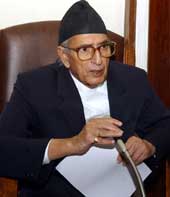 |
| Prime Minister G.P. Koirala in Kathmandu. (AFP) |
Kathmandu, May 3 (Reuters): Nepal’s new government announced today an indefinite truce to match a ceasefire declared by Maoist insurgents and said it would seek the withdrawal of Interpol arrest warrants against rebel leaders.
The new cabinet of Prime Minister Girija Prasad Koirala ? appointed after King Gyanendra bowed to weeks of protests and returned power to political parties ? would also remove the “terrorist” tag on the rebels, a cabinet spokesman said.
Today’s decisions are expected to help bring the Maoist rebels to talks aimed at ending a decade-old revolt that has killed thousands of people in the impoverished Himalayan nation, tucked between China and India.
“We expect them to come to talks,” finance minister Ram Sharan Mahat said after a two-and-a-half hour cabinet meeting. The cabinet also annulled elections to municipal bodies held in February by the royalist government and cancelled key administrative appointments, Mahat said.
There was no immediate official reaction from the rebels to today’s announcements. But one senior Maoist leader welcomed it.
“This could create a positive atmosphere for talks,” Comrade Sunil, a central committee member of the Maoist group, said.
Last week, the Maoists declared a three-month unilateral ceasefire saying it reflected their desire for the formation of a special Assembly to write a new constitution to decide the future of the monarchy.
That desire, also echoed by activists who took part in last month’s pro-democracy campaign, was then proposed to parliament by Prime Minister Koirala and approved by the chambers.
Simultaneously, Koirala also invited the rebels to talks to chart a roadmap for the vote. The Maoists have yet to formally react to those proposals as well.
But rebel chief Prachanda said the reinstatement of parliament was not what the Maoists wanted.
“The house cannot solve the problem,” Prachanda wrote in the pro-Maoist Nepali language weekly Janadesh, published yesterday.
The rebels have been fighting since 1996 to overthrow the monarchy and turn the mountainous nation into a communist republic.
More than 13,000 people have died in the conflict that has also shattered Nepal’s aid and tourism dependent economy. In 2001 and 2003, the Maoists pulled out of peace talks and broke ceasefires amid a row over their demand for the Assembly to decide the future of monarchy.
US assistant secretary of state for South and Central Asia, Richard Boucher, said the Maoists would remain on Washington’s list of terrorist groups despite plans by Nepal’s new government to begin talks to get them to rejoin the political mainstream.
“The Maoists should (first) lay down their arms and join the political process,” Boucher, the most senior foreign official to visit Nepal since the king stepped down, said.










